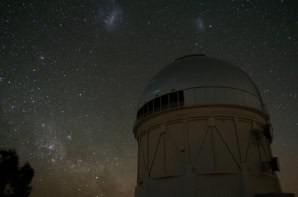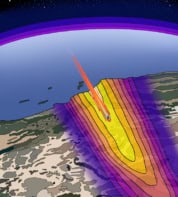The acceleration of the expansion of the universe places limits on future developments in technology according to two US cosmologists. Lawrence Krauss and Glenn Starkman of Case Western Reserve University have shown that the acceleration could put a fundamental limit on the total amout of information that can be stored and processed in the future (arXiv.org/abs/astro-ph/0404510). They also calculate that Moore’s Law will remain valid for no more than 600 years -- although workers in the semiconductor industry are more pessimistic and think that the famous law will break down in the next decade or two.
It is well known that the amount of information that can be processed and stored in any device is ultimately limited by the laws of quantum mechanics. However, Krauss and Starkman have shown that the nature of the universe itself also places limits on computation because it is not possible to transmit or receive information beyond the so-called global event-horizon in an accelerating universe.
The acceleration of the universe is driven by something that has repulsive rather than attractive gravitational interactions. However, although this so-called “dark energy” is thought to account for around two-thirds of the universe, no one knows what it is made of. Possible explanations for dark energy include a “cosmological constant” or something known as quintessence.
Krauss and Starkman have determined how far an observer could travel in such a universe and still be able to transmit energy back to Earth. They then determined how much energy could be transmitted this way. To calculate the total amount of information that could be processed, they assumed that the universe has a minimum temperature, below which no energy — and therefore no information — can be extracted. Theory predicts that this minimum temperature exists if the universe has a cosmological constant.
The duo calculated that the total number of computer bits that could be processed in the future would be less than 1.35×10120. This means that the effective information available to any observer within the event horizon of an expanding universe will be significantly less than the total so-called Hawking-Beckenstein entropy — the entropy that is associated with a black hole — in the universe. Many cosmologists predict that an accelerating universe will ultimately contain nothing but black holes, which will then eventually disappear themselves.
“It is remarkable that results from cosmology can provide such definite limits on the nature of technology,” Krauss told PhysicsWeb. “In addition, it is also remarkable that simple laws of physics put such robust constraints on life, and technology, even when we don’t know what that technology will be like.”
Krauss expects that the work will generate discussion on the limits of computation, intelligence, consciousness and civilization. “Ultimately arguments of this kind will have an impact on how we view ourselves, and our place in the universe — which is what science is all about.”



